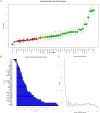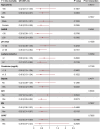Association of early enoxaparin prophylactic anticoagulation with ICU mortality in critically ill patients with chronic obstructive pulmonary disease: a machine learning-based retrospective cohort study
- PMID: 40421211
- PMCID: PMC12104056
- DOI: 10.3389/fphar.2025.1588846
Association of early enoxaparin prophylactic anticoagulation with ICU mortality in critically ill patients with chronic obstructive pulmonary disease: a machine learning-based retrospective cohort study
Erratum in
-
Correction: Association of early enoxaparin prophylactic anticoagulation with ICU mortality in critically ill patients with chronic obstructive pulmonary disease: a machine learning-based retrospective cohort study.Front Pharmacol. 2025 Jun 10;16:1636871. doi: 10.3389/fphar.2025.1636871. eCollection 2025. Front Pharmacol. 2025. PMID: 40556757 Free PMC article.
Abstract
Background: Chronic obstructive pulmonary disease (COPD) is a major contributor to global morbidity and mortality, particularly during acute exacerbations that frequently require intensive care unit (ICU) admissions. Considering the hypercoagulability associated with COPD, which intensifies during acute episodes, prophylactic anticoagulation therapy may help reduce ICU mortality. However, this potential has not been explored specifically in this population of patients.
Methods: We conducted a retrospective cohort study using data from the Medical Information Mart for Intensive Care IV, spanning patient records from 2008 to 2019 at the Beth Israel Deaconess Medical Center in Boston. This study focused on critically ill patients with COPD, employing feature selection methods, to identify key variables influencing clinical outcomes. The impact of prophylactic enoxaparin on prognosis was assessed using logistic regression models and Kaplan-Meier survival analysis.
Results: Our analysis included 4,433 critically ill patients with COPD, of whom 446 received enoxaparin within the first 72 h of ICU admission. The primary analysis showed that patients treated with enoxaparin experienced a 48% lower ICU mortality (odds ratio 0.52 [95% confidence interval 0.31-0.86]) than that of those not treated with enoxaparin, with an E-value of 3.26. This association between enoxaparin use and lower ICU mortality persisted across all subgroups examined. Additionally, a visual analysis of patients with varying Oxford acute severity of illness score (OASIS) indicated that early enoxaparin use was linked to an improved prognosis in critically ill patients with COPD who had higher OASIS than in those without.
Conclusion: Early initiation of prophylactic enoxaparin therapy was significantly associated with low ICU mortality in critically ill patients with COPD, especially in high-risk subgroups. These findings support the need for randomized controlled trials to confirm the effectiveness of thromboprophylaxis in this specific patient population and to evaluate the potential bleeding risks.
Keywords: chronic obstructive pulmonary disease; critical care; enoxaparin; machine learning; prognosis; prophylactic anticoagulation.
Copyright © 2025 Lin, Zhang, Dang and Zhan.
Conflict of interest statement
The authors declare that the research was conducted in the absence of any commercial or financial relationships that could be construed as a potential conflict of interest.
Figures




References
-
- Al Harbi S. A., Khedr M., Al-Dorzi H. M., Tlayjeh H. M., Rishu A. H., Arabi Y. M. (2013). The association between statin therapy during intensive care unit stay and the incidence of venous thromboembolism: a propensity score-adjusted analysis. BMC Pharmacol. Toxicol. 14, 57. 10.1186/2050-6511-14-57 - DOI - PMC - PubMed
LinkOut - more resources
Full Text Sources

